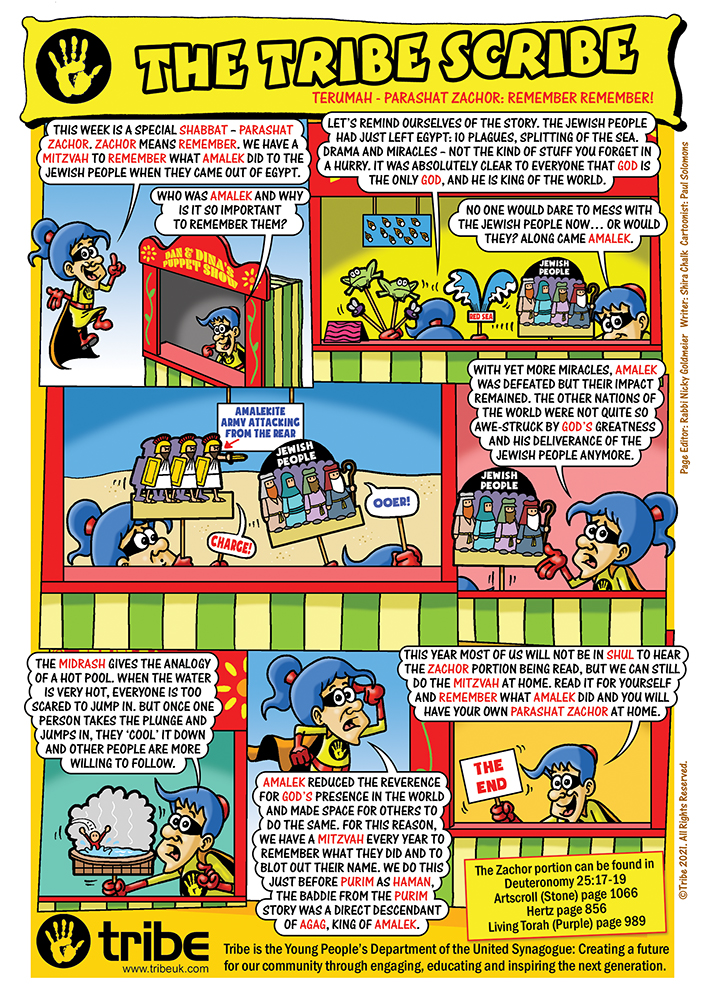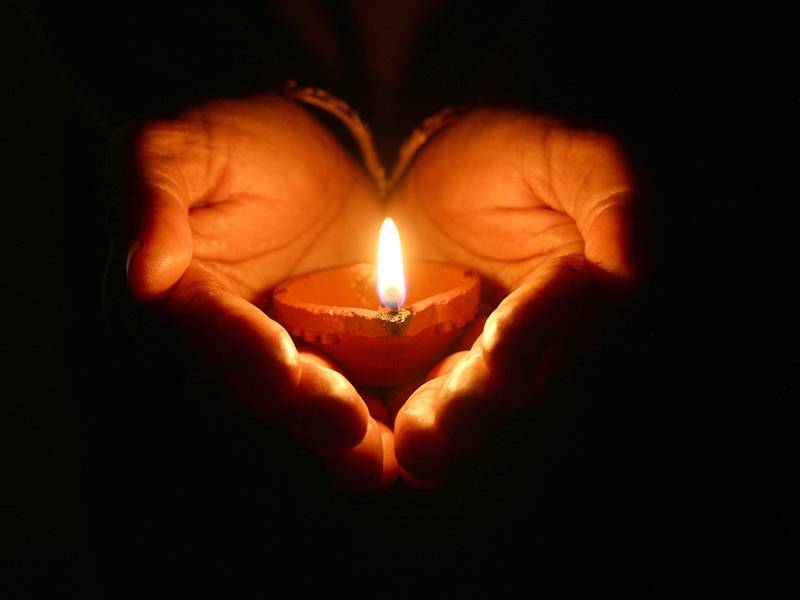Bonjour / Hello [nickname_else_first_name],

Shabbat Zachor ("Sabbath [of] remembrance שבת זכור) is the Shabbat immediately preceding Purim. Deuteronomy 25:17-19 (at the end of Parasha Ki Teitzei), describing the attack on the weakest by Amalek, is recounted.
Table of contents
1) Perashat Hashavoua - Rabbi Eli Mansour
2) Halakhat Hashavoua (Halakhot related to day to day life) By Hazzan David Azerad -
The Content of the Shema Paragraph - Peninei Halacha
3) Holy Jokes!
4) For KIDS

This Week's Parasha Insight with Rabbi Eli Mansour
Parashat Tesaveh- The Two Mishkans
Parashat Tesaveh continues the discussion of the Mishkan which was begun in the previous Parasha, Parashat Teruma.
As many have noted, the Torah is unusually repetitive with regard to the Mishkan. In Parashiyot Teruma and Tesaveh, G-d presents the detailed commands for building the Mishkan and its various components, and then in Parashat Vayakhel and Parashat Pekudeh, the Torah tells that Beneh Yisrael complied with these commands, and repeats each and every detail.
Normally, the Torah is very sparing in its words. The Sages find significance in an extra letter "Vav" in a word that could have been omitted. Why, then, do we find such repetitiveness when it comes to the Mishkan?
The explanation might have to do with the tragic story of Het Ha’egel – the sin of the golden calf – which is told in between the two sections dealing with the Mishkan.
A careful reading of these two sections reveals several subtle but important differences between them, which, as our commentators note, are understood in light of the far-reaching effects of Het Ha’egel, which necessitated some slight "adjustments."
The first difference is mentioned already by the Zohar. When G-d first commanded Moshe to accept donations for the Mishkan’s construction, He instructed that donations should be accepted "from any man" ("Me’et Kol Ish" – 25:2). After the golden calf, however, Moshe told the people to accept donations "Me’itechem" – "from among you" (35:5). The Zohar explains that after the golden calf, the Ereb Rab – the people who joined Beneh Yisrael when they left Egypt – were excluded from the project of the Mishkan. The Ereb Rab were the main instigators of the golden calf, and so afterward, they were not allowed to participate in the project of building the Mishkan.
Another difference has to do with the command of Shabbat. After Het Ha’egel, Moshe issued the command of Shabbat before conveying the commands regarding the Mishkan, whereas the initial command of the Mishkan before the golden calf was not introduced by the command of Shabbat. (The command of Shabbat was given after the instructions for the building of the Mishkan.) The explanation, perhaps, is that, as our Sages teach, Shabbat observance atones for the sin of idolatry. And so following the sin of the calf, before Beneh Yisrael could be worthy of having a Mishkan, they needed to affirm their commitment to Shabbat observance.
But perhaps the most obvious difference is the refrain "Ka’asher Siva Hashem Et Moshe" ("as G-d commanded Moshe") which runs throughout the section of the Mishkan which follows the story of the golden calf. The Bet Ha’levi (Rav Yosef Dov Soloveitchik of Brisk, 1820-1892) explains this emphasis based on the theory advanced by the Ramban concerning the nature of Het Ha’egel. The Ramban asserted that Beneh Yisrael actually sought to worship G-d through the agency of a golden calf; their mistake was that they decided on their own how to serve G-d, without following the rules that He instituted. And so after the sin of the golden calf, the Torah repeatedly emphasizes that Beneh Yisrael made every portion of the Mishkan "Ka’asher Siva Hashem Et Moshe," in precise compliance with the Almighty’s command.
These differences, as well as others, show us that these two sections – Teruma and Tesaveh, and Vayakhel and Pekudeh – describe two different Mishkans. The Mishkan of Teruma and Tesaveh was the ideal Mishkan which G-d wanted Beneh Yisrael to build after receiving the Torah at Mount Sinai. But in the wake of the golden calf, a slightly different Mishkan was required, in light of the grave mistake that the people had made.
If so, then we can perhaps "bridge the gap," so-to-speak, between the two views among the commentators regarding the command to build the Mishkan. Rashi writes that the Mishkan served to atone for the sin of the golden calf, implying that if not for this sin, a Mishkan would not have been necessary. The Ramban, by contrast, writes that the purpose of the Mishkan was to perpetuate Hashem’s Revelation which the people beheld at Mount Sinai at the time of Matan Torah. After revealing Himself to the people at Sinai, G-d then instructed them to construct a Mishkan where He would be revealed – albeit less directly – on a constant basis. According to the Ramban, then, the Mishkan was planned from the outset, and did not become necessary merely as a result of the golden calf.
In light of what we have seen, it is possible to accept both positions. As the Ramban wrote, the Mishkan was planned from the very beginning, even before the sin of the calf. However, as a result of this sin, a different kind of Mishkan was needed, one which took into account the lower stature to which the people fell. In this sense, then, the Mishkan indeed atoned for the sin of the golden calf. Thus, the Mishkan was planned from the outset – as the Ramban writes – but in the end turned out to atone for the golden calf, as Rashi explains.

Halachot this week are selected and Translated by Hazzan David Azerad
Parashat Zakhor -Peninei Halacha
The Sages instituted the reading of Parashat Zakhor once a year to fulfill the Torah commandment to remember and not forget the evil deeds of Amalek. One is viewed as forgetting about Amalek only if a year goes by without remembering it. So, we're going to make sure we mention the matter once a year. We read Parashat Zakhor on the Shabbat before Purim to juxtapose remembering Amalek to the destruction of his descendant Haman.
According to Torah law, one must express this remembrance verbally. There is no need, however, for every individual to read Parashat Zakhor from a Torah scroll; rather, everyone fulfills the mitzva by hearing another person read the verses from the Torah.
According to some of the greatest Rishonim, the Torah commands us to read Parashat Zakhor from the Torah scroll itself. Therefore, it is proper to read it from an exceptionally beautiful Torah scroll, and the reader must try to read the passage as meticulously as possible.
Preferably, everyone should hear Parashat Zakhor read according to his family’s accepted traditions of cantillation and pronunciation. Technically, however, members of all Jewish communities can discharge their obligation by hearing it read according to any version accepted among the Jewish people, whether it is Sephardic, Ashkenazic, or Yemenite.
One who finds himself in a place where there is no minyan should read Parashat Zakhor from a Torah scroll without a minyan. If no Torah scroll is available, he should read it from a ĥumash or a siddur.
Mitzvot require kavana (focused intent); therefore, one must have in mind to fulfill the mitzva of remembering Amalek’s deeds when reading or hearing Parashat Zakhor. It is a good practice for the gabbai or reader to announce this before commencing the reading.
Bevirkat Shabbat Shalom
David Azerad
3) HOLY JoKeS!!
Selection of funny snippets, loosely related to this weeks parashah or current events, to brighten your day



4) FOR KIDS
Click on the image to open the youtube video







 MABROOK!!!
MABROOK!!!





